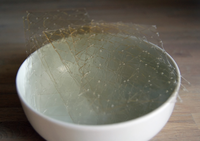
Photo from wikipedia
Improving the electrochemical capacitance performance of biomass-derived carbon electrode active materials for supercapacitor applications has recently attracted considerable attention. In the study, we develop hybrid electrode materials from rice husk-derived… Click to show full abstract
Improving the electrochemical capacitance performance of biomass-derived carbon electrode active materials for supercapacitor applications has recently attracted considerable attention. In the study, we develop hybrid electrode materials from rice husk-derived porous carbon(C) and β-Ni(OH)2 using a facile two-step solid-state reaction strategy. The prepared C/Ni(OH)2 composite materials were characterized by SEM (EDS), XPS, and XRD to acquire the physical and chemical information, which was used to demonstrate the successful preparation of C/Ni(OH)2 composite materials. The TGA measurement results confirmed that the thermal stability of C/Ni(OH)2 was changed owning to the presence of Ni(OH)2. As expected, C/Ni(OH)2 electrode materials possess higher specific capacitance (~ 952 F/g at the current density of 1.0 A/g) than that of pure biomass-based carbon materials under three-electrode system. This facile preparation method, which was used to fabricate electrode active materials, can extend to the value-added utility of other waste biomass materials for high-performance supercapacitors for energy storage applications.
Journal Title: Journal of agricultural and food chemistry
Year Published: 2020
Link to full text (if available)
Share on Social Media: Sign Up to like & get
recommendations!